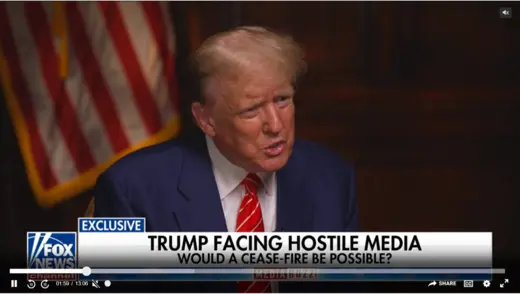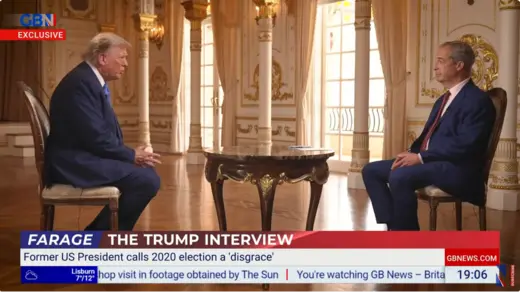Election 2024: Are Americans Turning Isolationist?

Mark Twain upon reading his obituary in 1897 quipped that “the report of my death was an exaggeration.” Repeated talk that the American public is turning isolationist merits a similar reaction. American internationalism may have weakened in recent years, but it is hardly dead and buried.
Consider first how Americans respond to a question that the Chicago Council on Global Affairs has been asking for half a century: “Do you think it will be best for the future of the country if we take an active part in world affairs or if we stay out of world affairs?” In the most recent survey, 57 percent of respondents opted for playing an active role. In contrast, 42 percent favored staying out of world affairs. This is down from 70 percent in 2018, but above the survey low, which was 54 percent in 1982. The Reagan years are seldom offered up as the era of isolationism.
More on:
A recent Associated Press-NORC Center for Public Affairs Research found a similar public tilt toward internationalism. In their poll, 23 percent wanted the United States to take a more active role in solving world problems, and 36 percent said that the current level of U.S. involvement is about right. In contrast, just 40 percent wanted the United States to be less active.
Polling questions about specific issues also raise doubts about the Americans-are-turning-inward narrative. The Chicago Council, for instance, has repeatedly found that Americans support maintaining U.S. military bases in Europe and Asia by substantial margins, while two-thirds believe that U.S. support for Taiwan strengthens U.S. national security and majorities support U.S. participation in a range of international agreements.
It's not just Chicago Council polls that find the American public favoring internationalism rather than isolationism. A Gallup poll last month found that two out of three Americans want the United States to keep or increase its commitment to NATO. Just 16 percent favor decreasing the U.S. commitment to NATO and only 12 percent—or fewer than one out of every eight Americans—want the United States to withdraw from NATO.
When the Associated Press-NORC Center for Public Affairs Research recently asked whether the United States should take a more or less active role in the war between Ukraine and Russia, 40 percent said that the current role is about right and 22 percent wanted the United States to do more. The numbers on the war between Israel and Hamas were about the same—41 percent and 21 percent.
So, if the American public isn’t clamoring for Washington to shed its overseas commitments, why does it seem that the United States is preparing to turn its back on the world? I will address that question in next week’s post.
More on:
Campaign Update
Former Vice President Mike Pence said last Friday that he will not vote for Trump for president in November. Pence attributed his decision to more than Trump’s actions on January 6, 2021. The former vice president said he believed that “Donald Trump is pursuing and articulating an agenda that is at odds with the conservative agenda that we governed on during our four years.” Pence declined to say who he would vote for other than to declare that “I would never vote for Joe Biden.”
The United Steelworkers union endorsed Biden for president on Wednesday. The decision comes just days after Biden announced his opposition to Nippon Steel’s offer to buy U.S. Steel. United Steelworkers represents some 850,000 workers, many of whom live in battleground states. United Steelworkers President David McCall said that “President Biden proved time and again during his first term that he stands with working families.”
The Candidates in Their Own Words
Trump made some foreign policy news this week, starting with his rally Saturday night outside Dayton, Ohio. Most of the attention was devoted to his comment that there will be a “bloodbath” if Biden wins in November. That prompted a spitting match between Trump critics saying that Trump was inciting violence and Trump supporters saying that he was pointing out that Biden’s policies are hurting the U.S. automobile industry. Here is the relevant passage:
China now is building a couple of massive plants where they’re going to build the cars in Mexico and think, they think that they’re going to sell those cars into the United States with no tax at the border. Let me tell you something to China, if you’re listening, President Xi, and you and I are friends, but he understands the way I deal, those big monster car manufacturing plants that you’re building in Mexico right now, and you think you’re going to get that, you’re going to not hire Americans and you’re going to sell the cars to us. Now, we’re going to put a 100% tariff on every single car that comes across the line, and you’re not going to be able to sell those cars, if I get elected. Now, if I don’t get elected, it’s going to be a bloodbath for the whole… That’s going to be the least of it. It’s going to be a bloodbath for the country. That’ll be the least of it. But they’re not going to sell those cars.
You can judge whether the “least of it” phrase broadens Trump’s claim beyond autos or not. What got lost in the coverage was the accuracy of Trump’s claim that China electric vehicle manufacturers, which are hyper-efficient and subsidized by the Chinese government, will use Mexico to flood the U.S. market with cheap electric vehicles. It turns out that the country-of-origins requirement in the U.S.-Mexico-Canada trade agreement, which Trump negotiated, will go a long way toward eliminating China’s cost advantage, unless Chinese manufacturers find ways to source a substantial percentage of their parts from U.S. manufacturers.
In a Sunday appearance on Fox News’ MediaBuzz, Trump was asked what advice he would give Israeli Prime Minister Benjamin Netanyahu. Trump answered: “You have to finish it up and do it quickly and get back to the world of peace. We need peace in the world…we need peace in the Middle East.” In the same interview, Trump said he couldn’t for sure say whether Russian President Vladimir Putin was responsible for the death of imprisoned Russian opposition leader Alexei Navalny: “I don’t know, but perhaps, I mean possibly, I could say probably, I don’t know.” Trump went on to say that Navalny was “a young man, so statistically he’d be alive for a long time… so something happened that was unusual.” When asked if he “would be willing to see Putin to swallow part or all of Ukraine,” Trump answered: “I hope that it doesn’t come to that.”
In an appearance on the podcast America First With Sebastian Gorka that was posted online on Monday, Trump’s former aide asked why he thought that Democrats like Senate Majority Leader Chuck Schumer were criticizing Netanyahu. Trump answered: “I actually think they hate Israel. I think they hate Israel. And the Democrat party hates Israel.” He went on to add: “Any Jewish person that votes for Democrats hates their religion.”
In an interview released on Tuesday night, Trump discussed foreign policy with Nigel Farage, the former head of Britain’s Brexit Party. Trump said that the United States would “100 percent” remain in NATO should he win in November if Europe paid “its fair share” of NATO’s costs. “NATO has to treat the U.S. fairly, because if it’s not for the United States, NATO literally doesn’t even exist,” Trump warned. He added: “We have an ocean in between some problems … we have a nice big, beautiful ocean.” Eighteen of NATO’s thirty-two member countries currently spend at least 2 percent of their GDP on defense, the target the alliance set at its 2014 summit. The stragglers, not surprisingly, are all countries located the furthest from Russia’s western border.
Trump also used the interview to say that he “got along great with Putin” and that the Russian president is someone he can negotiate with. When Farage said that former Australian Prime Minister and current Australian ambassador to the United States Kevin Rudd had called Trump a “traitor to the West,” the potential next American president responded that Rudd won’t be ambassador to the United States for “long if that’s the case” and “I hear he’s not the brightest bulb.”
What the Pundits Are Saying
The New York Times’s Angelo Fichera assessed Trump’s claims that if he had been president for the past three years that Russia would not have invaded Ukraine, Hamas never would have attacked Israel, and the United States wouldn’t have seen the inflation rate spike. Fichera concluded that “Trump’s suppositions underscore the ways in which he often airs questionable claims without explanation and which might not be supported by the broader context. And unlike simply attacking an opponent’s record or making a campaign promise, such alternative realities enjoy the benefit of being untestable.”
The Financial Times’s Alan Beattie castigated Biden’s decision to oppose Nippon Steel’s purchase of U.S. Steel, the subject of the lead essay in last week’s campaign roundup. Beattie called the decision “way out of proportion. Iron and steel manufacture directly employs around 80,000 people in the US, 0.06 per cent of the total workforce and comfortably less than half the number of American pedicurists and manicurists. US Steel itself has just over 20,000 workers, half the number of employees at Penn State University.” He added that “US trade policy is disturbingly vibes-based. There’s a vague sense of the need to be seen fighting trade wars rather than actually creating jobs.”
Semafor’s Jay Solomon reported that Trump may offer Republican Senators Tom Cotton of Arkansas, Bill Hagerty of Tennessee, and Marco Rubio of Florida senior national security roles in his administration should he return to the White House. Other names Trump is reportedly considering for senior posts include veterans of his administration: “former Secretary of State Mike Pompeo; John Ratcliffe, a one-time congressman who served as Director of National Intelligence; former National Security Advisor Robert O’Brien; and Trump’s ambassador to Germany, Ric Grenell.”
Bloomberg’s Jennifer Jacobs and Justin Sink reported that Trump has decided against naming Vivek Ramaswamy as his running mate, but he is considering offering his former campaign rival the position of secretary of Homeland Security. According to the report, “some Trump allies see Ramaswamy as ideal for the job because they say he excels at public speaking and, as an Indian-American son of an immigrant, could neutralize criticism of sweeping immigration restrictions.”
Foreign Policy’s James Crabtree argued that Asian leaders are wrong to be relaxed, unlike their European counterparts, about the prospect of Trump’s return to the White House. “This calm in Asian capitals borders on hubris,” according to Crabtree. “It misjudges the impact Trump’s return could have on Asian security and misreads the scale and ambition of his plans to remodel U.S. foreign policy. It also overstates the ability of Asian governments—from core U.S. allies to the more nonaligned nations in Southeast Asia and elsewhere—to manage Trump.”
The Financial Times’s Martin Wolf accused Trump of threating to “hand his friend, Vladimir Putin, victory over Ukraine.” The columnist wrote that to abandon Ukrainians “now in their hour of great need would demonstrate catastrophic western weakness at a moment of potential success: Russia would rejoice; the western alliance would crumble; and many would conclude that the US is in irreversible decline. For the US and the world, this truly is a decisive moment.”
Robin Niblett wrote in Foreign Policy that the G-7 summit, which is set to meet in Italy in June, is critical, and not just because it is a landmark anniversary—the fiftieth. In Niblett’s view the G-7’s challenge is “whether to cement the gains of the Biden presidency or lessen the global risks of a Trump presidency.”
What the Polls Show
Gallup asked Americans to name the country’s “greatest enemy today.” Forty-one percent said China, while 26 percent said Russia. That was a decline of nine points in the case of China compared to last year and six points in the case of Russia. Nine percent named Iran as the greatest enemy today, up from just 2 percent last year. Disagreements between Democrats and Republicans carried over to naming the country’s greatest enemy. Democrats cited Russia most often (48 percent), while Republicans (67 percent) and Independents (40 percent) cited China. Americans’ favorite countries, as measured by the percentage with “very favorable” or “mostly favorable” ratings, are Canada (83 percent), Japan (83 percent), Great Britain (82 percent), Germany (79 percent), and France (78 percent). Gallup did not run that survey question by the Chinese government as it considers Taiwan a country, which the United States doesn’t. The self-governing island had a combined favorability rating of 77 percent, putting it ahead of U.S. treaty ally South Korea (72 percent).
The Campaign Schedule
Robert F. Kennedy, Jr. is set to announce his vice-presidential running mate in four days (March 26, 2024).
The oral arguments before the U.S. Supreme Court on Trump’s claim that he has blanket immunity for all his actions while president are set to begin in thirty-four days (April 25, 2024).
The Republican National Convention opens in Milwaukee in 115 days (July 15, 2024).
The Democratic National Convention opens in Chicago in 150 days (August 19, 2024).
Election Day is 228 days away.
Inauguration Day is 304 days away.
Sinet Adous and Michelle Kurilla assisted in the preparation of this post.
 Online Store
Online Store

